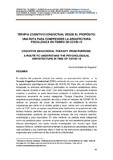Terapia cognitivo conductual desde el propósito: una ruta para comprender la arquitectura psicológica en tiempo de covid-19
Fecha
2021-03-31Autor
Palabras Clave
Terapia, Cognitivo Conductual, psicología, COVID-19Therapy, Cognitive Behavioral, Therapy Cognitive Behavioral psychology, COVID-19
Metadatos
Mostrar el registro completo del ítemResumen
El objetivo del presente artículo fue realizar un acercamiento teórico a la Terapia Cognitivo Conductual (TCC) partiendo de una ruta para comprender la arquitectura psicológica en tiempo de COVID-19. Para ello, se realizó una búsqueda de artículos arbitrados y publicados en revistas académicas sobre estos tópicos durante el año 2020. Con este importante y actualizado material empírico y analítico se pudo determinar mediante el análisis de contenido la presencia recurrente de cuatro categorías: Terapia Cognitiva Conductual, arquitectura psicológica, propósito de vida y crisis en tiempos de COVID-19. Al realizar un proceso de cruce de información se estableció la enorme importancia que tiene en el ámbito global y local, contar con una herramienta como la TCC como un apoyo importante para determinar el propósito de vida. Ambos linderos permiten que las personas enfrenten sus diversos conflictos intrapersonales, producto de cogniciones erradas, de una manera asertiva, autodirigida y poco traumática. En este contexto, se postula estas categorías como los paliativos para contener el gran peso de una pandemia global cuyos efectos psicológicos aún están siendo investigados con mucho rigor. Este espacio reflexivo, también permite entender la arquitectura psicológica desde la vida cotidiana y sus continuos retos a nivel de las estructuras aprendidas y las exigencias que conforman el día a día de la cotidianidad.
Colecciones
Información Adicional
| Otros Títulos | Cognitive behavioral therapy from purpose: a route to understand the psychological architecture in time of covid-19 |
| Correo Electrónico | fermenta@ula.ve / humanic@ula.ve soniamolinares1@gmail.com |
| ISSN | ISSN 07983069 |
| Resumen en otro Idioma | The objective of this article was to carry out a theoretical approach to Cognitive Behavioral Therapy from the purpose, starting from a route to understand the psychological architecture in time of COVID-19. To do this, a search was carried out for refereed articles published in academic journals on these topics during 2020. With this important and updated empirical and analytical material, the recurrent presence of four categories could be determined through content analysis: Cognitive Behavioral Therapy , psychological architecture, life purpose and crisis in times of COVID-19. When carrying out a process of information crossing, the enormous importance of having a tool such as CBT as an important support to determine the purpose of life was established in the global and local scope. Both boundaries allow people to confront their various intrapersonal conflicts, the product of wrong cognitions, in an assertive, self-directed and non-traumatic way. In this context, these categories are positioned as palliative to contain the great weight of a global pandemic whose psychological effects are still being rigorously investigated. This reflective space also makes it possible to understand psychological architecture from daily life and its continuous challenges at the level of learned structures and the demands that make up the day-to-day life. |
| Colación | 45-68 |
| Página Web | www.saber.ula.ve/fermentum |
| País | Venezuela |
| Institución | Universidad de Los Andes |
| Sección | Fermentum: Artículos |






